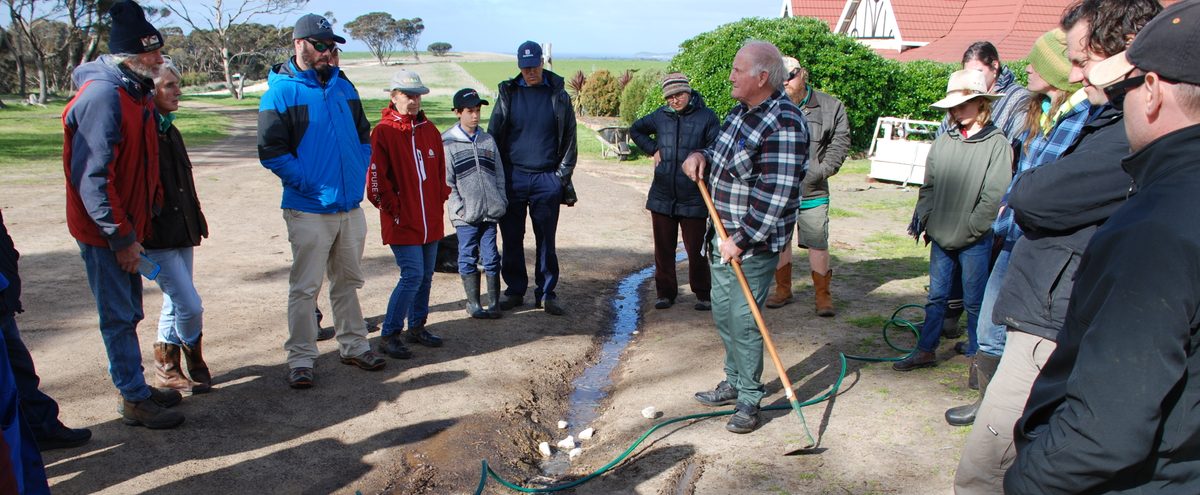
Introducing Natural Sequence Farming
On this page:
1. What is Natural Sequence Farming?
2. The five pillars of Natural Sequence Farming
3. How to apply Natural Sequence Farming
4. Weeds and Natural Sequence Farming
1. What is Natural Sequence Farming?
Natural Sequence Farming is a land management practice developed by Peter Andrews that is used to restore the natural water-cycle in agricultural landscapes. Natural Sequence Farming seeks to emulate the role of natural watercourses in an effort to reverse salinity, slow erosion and increase soil and water quality and enables native vegetation to regenerate and restore waterways. The method does not require the use of artificial fertilisers or herbicides.
Natural Sequence Farming practices also have the potential to improve soil health.
Click here for further information on Natural Sequence Farming principles and applications.
2. The five pillars of Natural Sequence Farming
There are 5 Pillars of Natural Sequence Farming:
- Slow the flow,
- Let all plants grow,
- Careful where the animals go,
- Filtration is a must know
- Return to the top to recycle the lot
Click here for more information on the 5 Pillars of Natural Sequence Farming.
3. How to apply Natural Sequence Farming
The application of Natural Sequence Farming approaches include the construction of structures such as leaky weirs and revegetation in and around watercourses. These approaches slow the flow of water through the landscape increasing soil moisture retention, improving water quality and have the potential to reduce the impacts of droughts and climate change on the agricultural landscapes of Kangaroo Island. The construction of these structures may require a water affecting activity permit.
4. Weeds and Natural Sequence Farming
One aspect of Natural Sequence Farming that is not supported by the Kangaroo Island Landscape Board is the promotion of working with weeds in watercourses, rather than targeting weed eradication.
Weeds have significant detrimental impacts on the biodiversity and ecological health of aquatic and terrestrial ecosystems. Many of the species of weeds utilised in Natural Sequence Farming approaches are not found on Kangaroo Island. The introduction of new species of weeds could have devastating impacts on our island’s economy and ecology and is likely to be an offence under the Landscape South Australia Act 2019.
The Kangaroo Island Landscape Board supports and promotes the use of plants that are native to Kangaroo Island and that have been grown from seeds of local provenance for revegetation projects. For information on appropriate plant species to grow on your property please contact the Kangaroo Island Landscape Board Native Plant Nursery on kinativeplantnursery@sa.gov.au or 0437 322 692.
Many of Kangaroo Island’s native plants are very suitable for use in Natural Sequence Farming practices.
Information on identifying and managing weeds that pose a serious risk to Kangaroo Island’s environment and primary industries can be found here:
or by contacting the Kangaroo Island Landscape Board on ki.landscapeboard@sa.gov.au or (08) 8553 2476.
5. Natural Sequence Farming training courses
Tarwyn Park Training is currently advertising a number of Natural Sequence Farming training courses. Details can be found here.
The Kangaroo Island Landscape Board has funding available to support Kangaroo Island land managers wanting to learn more about Natural Sequence Farming practices. These funds can be provided to subsidise the cost of training courses. Please contact the Kangaroo Island Landscape Board on ki.landscapeboard@sa.gov.au or (08) 8553 2476 if you are interested in attending a training course.
6. Find out more about Natural Sequence Farming
6.1 Articles about Natural Sequence Farming
- Why is everyone talking about natural sequence farming?
- Re-coupling the carbon and water cycles by Natural Sequence Farming
- The applicability, efficacy and risks of Natural Sequence Farming in the dryland agricultural zone of south west Western Australia
- Soaking up Australia’s drought
6.2 Videos about Natural Sequence Farming
- Introducing Natural Sequence Farming at Marloo: Stuart Andrews at Futurelands
- Watch Australian Story's Hope Springs on ABC iview or Youtube
- Over the Fence with Stuart Andrews from Forage Farms - Natural Sequence Farming
6.3 Podcasts about Natural Sequence Farming
This project is supported by the Kangaroo Island Landscape Board through funding from the Australian Government.
More information
Manager Sustainable Landscapes
35 Dauncey Street Kingscote SA 5223
+61 08 8553 2476
